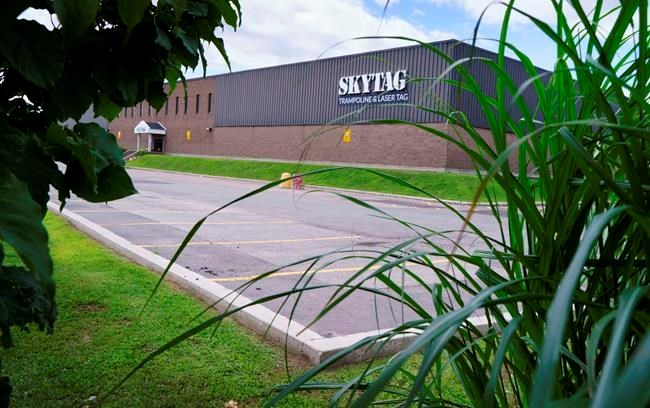MONTREAL — A Montreal-area trampoline and laser tag centre is offering homeschooling services to parents worried about sending their kids back to school during the COVID-19 pandemic.
The co-owner of the trampoline centre, Danielle Delannoy, insists what she's offering is essentially a childcare option with some homework help, but critics of the project accuse her of running an illegal school.
Quebec's back-to-school plan provides for all students to return to classrooms in person at the end of the month. Only students who meet narrow criteria for medical exemptions are eligible for remote learning services provided by the Education Department.
In response, some parents are opting to homeschool their children.
Skytag, a 40,000 square-foot amusement centre in the Dollard-Des Ormeaux suburb, is offering "learning pods" for small groups of children of similar academic levels to spend the day socializing and doing schoolwork together under the supervision of a what the business calls a "facilitator."
Delannoy says many parents are worried about sending their children back to class or having to scramble if schools get shut down.
"It's about a plan for working parents to know that, regardless of what happens in this uncertain time, your child will be getting their education, will be physically active, won't be stuck at home ... and the child will be socializing," she said in an interview Wednesday.
She said the classroom bubbles will be kept to 10 students at a maximum, and classrooms would not interact or share tools or teachers. The children will be registered as homeschoolers, and follow a program set out by their parents and a Quebec homeschooling association.
Marwah Rizqy, the Quebec Liberal education critic, urged the education minister to act against Skytag, which "proposes to parents to sign up for school but not go to school — to go to play trampoline games and laser games."
The Quebec Education Department said it was looking into the situation after receiving messages from worried parents.
"Potential irregularities having been noted, a notice of non-conformity will be issued," a department spokesperson said in a statement Thursday. "The regulatory frameworks are there to ensure that all students have the right to a quality education and we won't compromise that."
But Delannoy insists her business meets all the legal requirements.
"I really, really want to push the fact that we are not trying to game the system," she said. "We feel we're doing our civic duty in allowing the public an option to homeschool their child and to do it within a safer environment."
She said the program, which costs $290 a week, is not lucrative since the number of children would be limited to 60 due to physical distancing requirements.
Despite the controversy, Christine Brabant, a professor of education at the Universite de Montreal who has studied homeschooling, says the centre doesn't appear to be doing anything wrong.
She said while parents are responsible for their children's education under the province's homeschooling policies, there's nothing to say parents can't delegate teaching duties to a tutor, to another parent, or use the services of a support centre.
Homeschooling is "not necessarily at home, and not necessarily by the parents," Brabant said in an interview Thursday.
Most so-called "illegal school" cases in Quebec have dealt with institutions that don't allow children to receive a proper education, such as religious schools or intensive sports programs that require long hours and leave no time for study of the provincial curriculum, she said.
A school is also illegal if it tries to take full responsibility for a child's education, including furnishing materials, providing all teaching and issuing a diploma without a permit, Brabant added.
But there's nothing wrong, she said, with parents sending their children to a place that looks like a classroom setting where the kids get help with schooling or tutoring.
She said parents who are interested in different homeschooling options should familiarize themselves with the regulations, because parents will be ultimately responsible for ensuring their child's education.
This report by The Canadian Press was first published Aug. 20, 2020.
Morgan Lowrie, The Canadian Press



